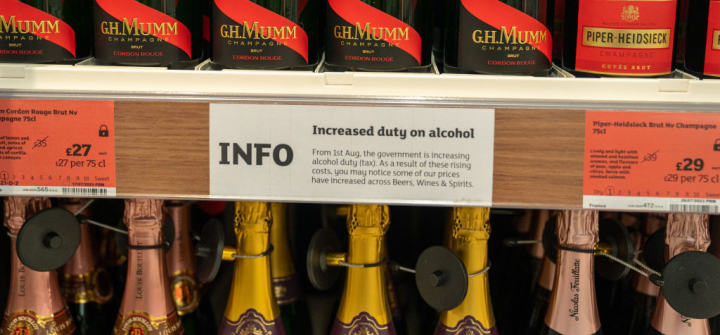Alcohol Taxes Are a Public Health Win-Win
When it comes to alcohol, anyone calling for added oversight is cast as a buzzkill. Alcohol use remains stubbornly rooted as a cultural norm in most of the world, and few recognize it as a public health threat.
Yet heart disease, cancers, falls, violence and other issues linked to alcohol use cause nearly three million deaths a year.
In a welcome trend, though, the growing interest in dry January, along with the popularity of non-alcoholic cocktails and near-beers (a market that surged to $11 billion in 2022), signal shifting attitudes about drinking—at least in some corners of the globe. What’s still mostly missing amid growing scientific consensus and changing trends is meaningful policy to reduce death, disability, and disease caused by alcohol consumption. Increasing alcohol taxes and codifying common-sense measures—like limiting marketing and the hours people can buy alcohol—can reduce heavy consumption and ease long-term health care costs associated with alcohol-related diseases.
A major challenge, though, is that when sound public health policy bumps up against corporate interests, disinformation often follows. Proposed and enacted tax hikes on alcohol—the single most effective policy to discourage both adults and youth to drive down consumption, and therefore the biggest threat to the industry—have stirred pushback, from Thailand to New Zealand to the U.S. Most of these lobbying tactics are lifted straight out of the Big Tobacco playbook, even as tobacco use has been deglamorized and made significantly more costly—from Canada to the Philippines—in the face of overwhelming, evidence-driven data.
In this war of perception, industry speak flourishes. Consider these five falsehoods peddled by industry to impede the rollout of lifesaving laws:
1. Drinkers will reject price increases as part of the “nanny state.”
Reality: This isn’t about regulating adults’ freedom of choice. It comes down to pricing harmful products proportionate to the public health and economic toll their use takes on individuals and societies and, ideally, encouraging consumers to consider the reasons behind these policies. Added taxation that increases prices is especially effective in deterring underage drinkers. In Trinidad and Tobago, where 60% of households were found to consume alcohol as of 2018, a survey conducted that same year showed overwhelming support for increasing alcohol taxes.
2. Price increases won’t deter youth drinking.
Reality: It’s no coincidence that cigarette taxes in New York state are among the highest in the U.S. (and as of this month, they will be the highest in the world) and that the state has seen youth smoking rates plummet by more than 90% since 2000. Statistics like that spook alcohol companies, and they will double down on enticing new generations of drinkers—but the above figures underscore that contemporary teenagers are warier of corporate motives than generations past. Changing the spending patterns of adults with entrenched habits and more disposable income can be especially challenging—all the more reason to promote policies that keep young adults from becoming alcohol users.
3. Higher taxes and prices will hurt poor people the most.
Reality: Chronic health conditions and injuries, and related expenses due to excessive alcohol consumption, are what hurt poor people. Individual spending on alcohol that supersedes spending on essential goods and services, like food and schoolbooks, can exacerbate the cycle of poverty. But because lower income people are more sensitive to price, they are more likely to decrease consumption and then reap the benefits of income shifted back to spending on health and education. Moreover, strong policy can help ensure that alcohol tax revenue gets redistributed into social welfare programs that help those most in need.
Guatemala, in one innovative example, has redirected alcohol tax revenues to family planning programs with great success. In the Philippines, alcohol taxes help pay for universal health care. And in Kenya, civil society advocates (in partnership with Vital Strategies’ RESET initiative) are fighting to make sure alcohol tax rates keep pace with inflation so they remain a vital fiscal tool and deterrent.
4. Alcohol taxes will prop up the illicit market.
Reality: Any bump in illicit sales after a tax increase does not come close to reversing the public health rewards from overall decreased consumption and higher tax revenues. Also, when taxes increase on regulated products, profit-minded makers of illicit products raise their prices, too. Functionally, higher prices in both markets simply means rates of consumption will go down across the board. Fortunately, most regions also have well-developed mechanisms to monitor and rein in criminal conduct related to illicit markets. The need is for laws and methods of enforcement that impose accountability.
3. Companies will find ways to dodge regulations.
Reality: Not if governments replicate the way Kenya implemented strict track-and-trace protocols along every step of the supply chain for tobacco and alcohol products. Leveraging new technology to authenticate alcoholic products’ path from manufacture to retail, including their adherence to tax codes, can both chill the illicit market and keep the legal market in line. Yes, it will require a modest financial investment—funds that, fittingly, can be raised quickly by alcohol taxes or other fees to alcohol companies, with no real burden on governments or society.
The alcohol industry has spent decades promoting a false dichotomy that pits people against their own best interests. We’ve seen this scenario play out before—notably with the tobacco industry—and the consequences are both deadly and costly. Governments owe their citizens a more healthful and flourishing future.
Jeffrey Drope, Ph.D., is the lead author of The Tobacco Atlas and research professor of public health at the University of Illinois Chicago. Drope is a leading expert on taxation of unhealthy products, illicit trade in tobacco products, and the economics of tobacco farming. Beyond tobacco and alcohol, he also researches other major risk factors for noncommunicable diseases such as poor nutrition and physical inactivity.
Rebecca Perl is vice president of partnerships and initiatives for Vital Strategies, a partner in the tobacco industry watchdog STOP, and advises governments and nongovernmental organizations on communication strategies for tobacco control and alcohol policy campaigns around the world.
Join the 50,000+ subscribers in 170+ countries who rely on Global Health NOW summaries and exclusive articles for the latest public health news. Sign up for our free weekday newsletter, and please share the link with friends and colleagues.
A notice is posted about a rise in duty for alcoholic beverages August 4, 2023 at a Sainsbury's Market in London, England. Robert Nickelsberg/Getty






